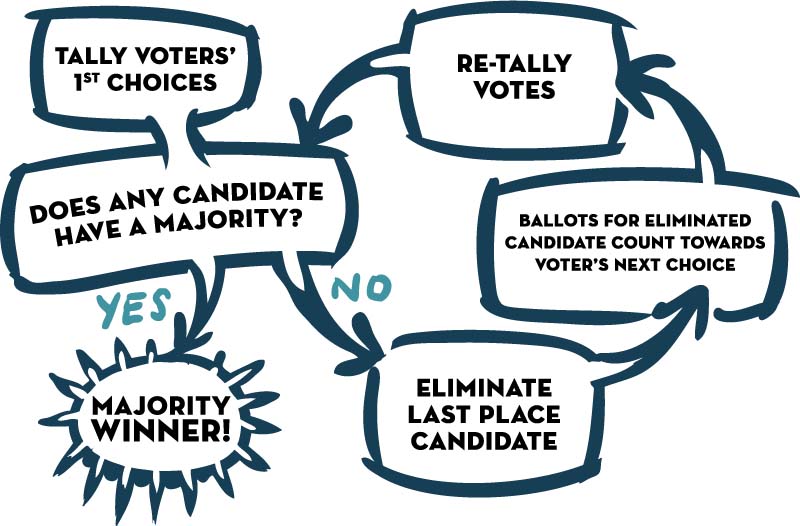This diagram from VotersChoice.org illustrates how ranked choice voting eliminates the need for run-off elections.
SALT LAKE CITY – Some lawmakers think that the time for ranked-choice voting in Utah has come and are willing to twist the arms of county clerks until they go along.
A proposal to do just that from Rep. Jeffrey Stenquist of Draper passed the Utah House on Friday by a vote of 46 to 25.
House Bill 75 would require Utah county clerks to administer elections using so-called “instant run-off voting” for any of their local cities that opt to join the state’s Municipal Alternative Voting Pilot Project.
But some county officials – including Cache County Clerk Jess Bradfield – are dubious about both the need and value of ranked-choice voting.
“I worry that ranked choice voting is being sold as a kind of miracle voting method,” Bradfield explains. “It may lead to greater voter discouragement when vast political change isn’t realized.”
The budgetary note attached to HB 75 predicts that implementation of the statute would have no fiscal impact for the state. But some county clerks have voiced concerns to their lawmakers that having to administer ranked-choice may involve unanticipated expenses at the local level.
Lawmakers created the Municipal Alternative Voting Pilot Project in 2018. That initiative authorized cities to employ ranked-choice voting in their elections starting in 2019, when the relatively small Utah county municipalities of Vineyard and Payson opted for largely successful instant run-off voting.
Rather than selecting a single candidate on their ballots, ranked-choice voting allows participating citizens to rank all candidates for a particular office from their favorite to their least-favorite. If no candidate initially earns a majority of votes, a computer algorithm eliminates the candidate with the least votes and reallocates those ballots to those voters’ second choices. That process continues until a candidate has the majority of votes.
Most recently, ranked-choice voting was employed by both the Republican and Democratic parties of Utah to pair down huge fields of candidates during their state conventions in April of 2020.
In the GOP gubernatorial race, for example, ranked-choice voting eliminated two candidates and propelled then Lt. Gov. Spencer Cox and former Gov. Jon M. Huntsman Jr. toward the Republican statewide primary on June 30.
In the race to replace outgoing U.S. Rep. Rob Bishop in Congress, Blake Moore and Kerry Gibson emerged from a field of 12 candidates, thanks to ranked-choice voting.
Both the Republican and Democratic parties of Utah used Voatz, a for-profit election consultancy firm, to facilitate electronic balloting and ranked-choice voting during their 2020 online conventions.
In December, the Lehi city council voted to join their Utah county neighbors in Payson and Vineyard in employing ranked- choice voting in the 2021 municipal elections. Stenquist says that “at least a half-dozen cities in Salt Lake County” want to try ranked-choice voting, but the county clerk there is refusing to support them.
The Utah pilot program allows municipalities that opt for ranked-choice voting to contract with outside agencies like Voatz to conduct the complex balloting processing operations. The cost of that service has been seen as a limiting factor for many cities, however. But HB 75 would require county clerks to provide that support instead, transferring at least some of expense of ranked-choice voting to county level.
Some county clerks have also pointed out that ranked-choice voting is only really beneficial in terms of avoiding run-off elections by reducing large fields of candidates, a circumstance that seldom arises in municipal elections.
“Rather than a more passive voting method that removes election primaries,” Bradfield suggests, “we would be better served by a more active electorate that encourages the best among us to run.
“The quality of our candidate pool will always be more important than the style in which their names are circled on the ballot.”
With the 2021 legislative general session now half over, the fate of HB 75 is uncertain as it moves from the Utah House to consideration in the state Senate.

